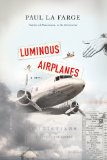Summary | Excerpt | Reviews | Beyond the Book | Readalikes | Genres & Themes | Author Bio

A Novel
by Paul LaFarge
"I hear they cleaned up the Y," Marie said one year. "It has a new swimming pool. Maybe you'd like to give it a try?" I told her the story I'd heard at school about a kid who went into that pool and didn't come out again. "Hm," Marie said, and the Y took its place again at the end of the alphabet. School ended and the real hot weather came. The windows were always open; our living room became a big, dusty receiver for the dramas broadcast from the street. The Celestes sprawled in side-by-side chairs in front of the electric fan, waiting for it to be night. They talked about the opening they'd gone to in SoHo, the artist who'd got the show by sleeping with the dealer, the writer who'd written about the show but didn't know what the word lacuna meant. Just when I thought they had forgotten about me completely, suddenly they turned to each other, their mirror-faces wrinkled by mirror-frowns, and one said to the other, "Don't you think it's time to send him to Thebes?"
SAN FRANCISCO, CITY OF GHOSTS
The Doghouse was crowded with Labor Day drinkers trying noisily to give substance to the illusion that San Francisco had had a summer. There was a back patio with a phenomenal view of the underside of Highway 101; as traffic whooshed by overhead, I told Alice how my mothers wanted me to pack up my grandparents' house.
"Don't they live in New York?" Alice asked. "Let them do it."
"They don't like the house. They hate going there."
"Too bad for them."
Alice had never met my mothers, but over the years she had acquired a kind of sympathetic dislike for them, which I sometimes felt guilty about instilling in her. She would have told me to stand up to them even if she liked them better, though: Alice was in favor of standing up to people. She stood up to her professors at Berkeley, who thought that a nobody girl from the Central Valley couldn't know anything about American lit; she stood up to her college boyfriend, who was just a version, she realized afterward, of her Christ-nut father; and she stood up to me.
"Don't worry," I said, "I'm not going."
We got drinks and alit on a free table out back. "How was the festival?" Alice asked.
"Windy," I said. "There were dust storms." Alice hated dirt; she was the only person I knew in San Francisco with white wall-to-wall carpet in her apartment.
"That must have been tricky when you were tripping your brains out."
"Ha. We didn't do drugs, just some pot." I had, in fact, taken a mescaline derivative, synthesized by a friend of Star's, which made everything give off blue sparks, as if the landscape were effervescing in the cold night air, but I didn't want Alice to be jealous.
"I see." Wary of learning more than she wanted to know, she changed the subject. "Were you close to your grandfather?"
"I wouldn't say close. I spent the summers with him when I was a kid, but he wasn't easy to know." I told Alice about thebasement workshop where my grandfather restored old tables and chairs, or rather, given that nothing he touched ever returned to anything like the life it once had, it might be more accurate to say that he reincarnated them. When confronted with an old table, unsteady on its feet, topped with warped boards that had begun to detach from one another, his ordinarily serious face would soften, and as he stroked the table's uneven surface he'd murmur, "Good grain. Good wood." I knew what was going to happen: the table would come home with us; we'd carry it into the garage, where it would linger until my grandfather tried to correct its irregularities or it fell apart of its own accord, which amounted to more or less the same thing. Even then he would save the timbers that hadn't rotted or been planed down to nothing. "Might patch something with these," he'd say. "It's good wood."
"He sounds sweet," Alice said.
"He wasn't. Kind, sure. But not sweet." Every year, he had sent me the same card on my birthday, with a picture of a Japanese fisherman in a little boat caught in the crook of an enormous wave, and each year the message inside the card was shorter. The last of the cards came just a month before he died. Happy birthday to my great grandson, it read, which confused me, because I was only his grandson. Finally I'd decided that he must have preferred the pun to the reality of the situation, but still, as a grandson, it made me feel less than great.
Copyright © 2011 by Paul La Farge




The fact of knowing how to read is nothing, the whole point is knowing what to read.
Click Here to find out who said this, as well as discovering other famous literary quotes!
Your guide toexceptional books
BookBrowse seeks out and recommends the best in contemporary fiction and nonfiction—books that not only engage and entertain but also deepen our understanding of ourselves and the world around us.